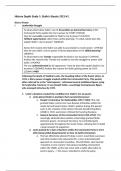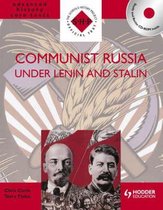History Depth Study 1: Stalin’s Russia 1921-41
Rise to Power
i. Leadership Struggle
To what extent does Stalin’s use of his position as General Secretary of the
Communist Party explain his rise to power by 1928? (15MJ42)
How far was Lenin responsible for Stalin’s rise to power? (16MJ41)
‘Brilliant opportunism rather than careful planning.’ To what extent does this
explain Stalin’s rise to power? (16ON42)
Assess the reasons why Stalin was able to accumulate so much power. (17MJ42)
How far was Stalin’s rise to power in Russia dependent on his skilful planning?
(18ON41)
To what extent was Trotsky responsible for Stalin’s rise to power? (19MJ41)
Analyse the reasons why Trotsky was unable to win the struggle for power with
Stalin. (19ON43)
‘He was underestimated by his opponents.’ How far does this explain Stalin’s rise
to power? (20ON42) Analyse the reasons for Stalin gaining power by 1929.
(21ON41-9489)
Following the death of Vladimir Lenin, the founding father of the Soviet Union, in
1924, a fierce power struggle erupted within the Communist Party. This period,
often referred to as the "Interregnum," witnessed several ambitious figures vying
for leadership. However, it was Joseph Stalin, a seemingly inconspicuous figure,
who emerged victorious by 1929.
1. Lenin’s decisions created the conditions for Stalin’s rise to power.
o Lenin placed Stalin in positions that concentrated power
o People's Commissar for Nationalities (1917-1923): This role
granted Stalin control over non-Russian ethnicities within the
newly formed Soviet Union. Stalin's policies during this period,
such as the creation of the Union of Soviet Socialist Republics
(USSR) in 1922, were later criticized for favoring Russians
o General Secretary of the Communist Party (1922-1952): This
seemingly administrative position surprisingly granted Stalin
immense power. As General Secretary, he controlled party
appointments throughout the Soviet Union, allowing him to build
a loyal network of supporters
o Lenin pushed for a ban of factions within the Communist Party in 1921
after facing initial disagreements on how to build communism
o The ban effectively silenced Trotsky, Lenin's most likely successor,
and other leaders who advocated for a more internationalist
approach to communist revolution. This left Stalin, who favored
"socialism in one country" (focusing on building communism
within the USSR), as the sole voice with a viable alternative to
Lenin's legacy. -> This move, intended to unify the party,
, ultimately eliminated potential rivals and cleared the path for
Stalin's dominance.
o Following assassination attempts and a debilitating stroke in 1922,
Lenin became increasingly withdrawn from politics. This power vacuum,
coupled with growing reverence for Lenin as the "founder of the Soviet
state," led to the unintended consequence of a burgeoning cult of
personality:
o Hero Worship: Propaganda glorified Lenin's leadership, creating a
sense of near-deification. This established a precedent for a single,
charismatic leader at the head of the party, a role Stalin readily
adopted. -> While Lenin may not have actively fostered a cult of
personality, the groundwork laid during his illness and eventual
death in 1924 created a space for Stalin to manipulate this
reverence and his own position as General Secretary to solidify his
position as Lenin's successor.
Overall, while Lenin likely intended to consolidate Bolshevik power, he
ultimately laid the groundwork for a totalitarian dictatorship under Stalin.
2. Trotsky made critical mistakes that weakened his position as a rival against
Stalin and further gifted Stalin the opportunity to rise to power
o Trotsky’s abscence from the funeral sparked controversy, damaging his
image among other party members. Trotsky cited illness as the reason
for his absence. However, many viewed this as a flimsy excuse, portraying
him as disrespectful to Lenin's memory and less committed to the party.
This damaged his image among other party members. Stalin, in contrast,
meticulously cultivated an image of loyalty to Lenin throughout his illness
and after his death.
o Trotsky's personality and political strategies also presented exploitable
weaknesses.
o Ex-Menshevik and Jewish Background: Anti-semitism and
suspicion of those previously associated with the Mensheviks were
prevalent within the party. Stalin subtly used these prejudices to
undermine Trotsky's credibility.
o Complex Personality: Trotsky's confident and sometimes diffident
personality could be off-putting. For instance, he famously
rejected Lenin's initial offer to be department chairman of
Sovnarkom in 1917, a move seen by some as arrogant.
Additionally, his wartime heroism in the Red Army made some
wary of his potential military influence.
o Stalin, a master manipulator, effectively portrayed Trotsky as an
outsider and a threat, further solidifying his own position within
the party.
o Trotsky’s theories and ideologies were less popular compared to Stalin’s
more practical ones.
, o Criticising Party Bureaucratization (1925): Trotsky fiercely
criticized the growing bureaucracy within the Communist Party,
viewing it as a threat to revolutionary ideals. This criticism
alienated the very party officials Stalin was courting, a powerful
and growing segment of the party with vested interests in
maintaining the status quo. Trotsky's focus on ideology alienated
the party machinery that Stalin was actively cultivating.
o Permanent Revolution Theory: This theory posited that a
successful socialist revolution in Russia would spark socialist
revolutions across Europe. However, by the mid-1920s, these
revolutions hadn't materialized, weakening Trotsky's overall
revolutionary vision. Additionally, Stalin effectively framed
"socialism in one country" (focusing on building communism
within the USSR) as a more pragmatic and achievable alternative.
o While Trotsky's theory resonated with some, its lack of immediate
success allowed Stalin to position himself as the more practical
leader.
Overall, Trotsky's absence at Lenin's funeral, his complex and unpopular
personality, his criticism of party bureaucracy, and the perceived
weaknesses of his "Permanent Revolution" theory all served to weaken his
position within the party. These missteps gave Stalin the opportunity to
exploit these weaknesses and consolidate his own power base.
3. Stalin exploited opportunities and adopted pragmatic strategies to
outmaneuver his rivals, boosting his rise to power. (mix of points 1 and 2)
o Exploiting the power of the General Secretary (1922-1924): Appointed
General Secretary of the Communist Party in 1922, a seemingly
administrative role, Stalin recognized its hidden potential: Stalin used his
control over party appointments to place his loyal supporters in key
positions, building a powerful network within the party apparatus. Under
his leadership, party membership skyrocketed. From 1922 to 1924, the
party grew from around 500,000 to over 700,000 members, with a
significant increase in new recruits with limited experience. -> This
shrewd utilization of the General Secretary's role proved critical in
consolidating his power base.
o Championing Socialism in One Country (1924): Following Lenin's death in
1924, the party debated the future of communist revolution. Here, Stalin
saw an opportunity: Trotsky advocated for "Permanent Revolution,"
urging the spread of communism throughout Europe. However, after
years of civil war and economic hardship, many party members craved
stability. Stalin countered with "Socialism in One Country," focusing on
building communism within the USSR's borders. This resonated with a
war-weary populace and positioned Stalin as the more pragmatic leader.
-> Stalin's ability to read the room and tailor his message to the desires of
the party proved crucial in garnering support.





